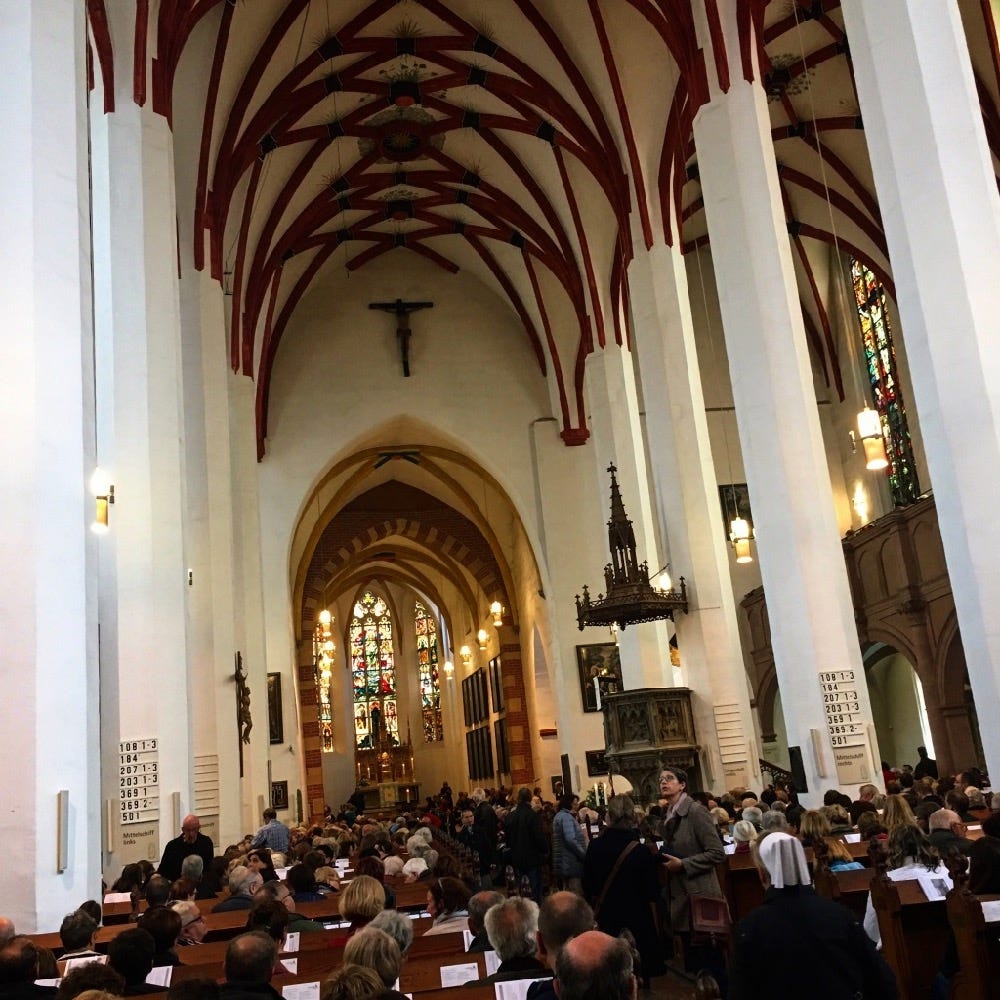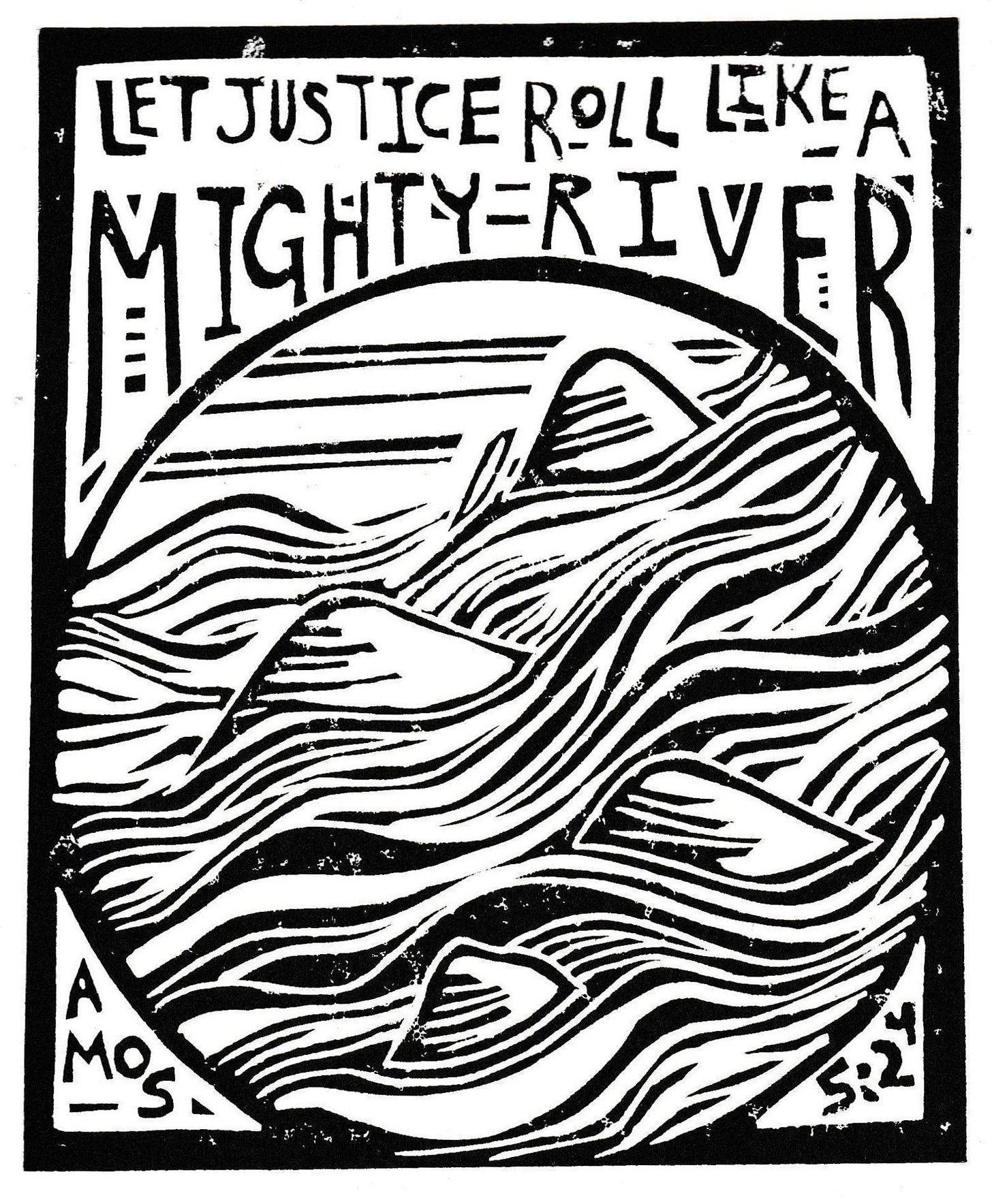A beautiful reflection by Jeff Chu on "Wir müssen durch viel Trübsal in das Reich Gottes eingehen," which translates to "We must enter the Kingdom of God through much sorrow."
.
The 24th Day after Coronatide*
Grand Rapids, Michigan
Greetings, friend.
It might seem strange that I tell you, at the top of every letter, that I’m writing from Grand Rapids, Michigan. I’m always writing from Grand Rapids, Michigan. It’s partly a pretentious thing: I love those old letters, scrawled in ink, where the writer tells you she’s writing from Bergamo or Constantinople or the Argentine. It’s also partly hope. One day, I will write you a letter from somewhere other than Grand Rapids, Michigan, because we will be able to travel again.
I need that vain hope right now. It’s been a tough couple of weeks, and maybe I’ll write another time about precisely why. For now, though: I was thinking the other day about Bach and a cantata I heard a few years ago. (Yes, I’m a weirdo. I’d say caveat lector, but it’s too late for that. You already knew I was strange from the previous paragraph, many of you knew even before, and still, you kept reading.)
Three springs ago, when we could still travel, I went to Leipzig, Germany, on assignment for Travel+Leisure magazine. The story’s marching orders had something to do with hipsters and visual artists and low rents and edgy neighborhoods. (
You can read the story here.) Shockingly, my editors didn’t particularly care that it was the 500th anniversary of the Protestant Reformation. Nor were they all that interested in what I really wanted to do in Leipzig: I wanted to hear Bach.
The Saturday-afternoon motet at the Thomaskirche is one of the world’s great bargains: two euros for a 75-minute performance that usually features both the Thomanerchor, the famed boys’ choir that has been singing for eight centuries, and a small ensemble of the Gewandhaus, one of the world’s oldest and best orchestras. When I asked an usher whether I was in the right place for the Bach concert, he stiffened and hissed a five-word rebuke: “It is a worship service.”
The service took place in the same 15th-century Gothic church in which Bach, as kapellmeister for 27 years, had come alongside the congregation musically Sunday after Sunday. He wrote for this space—or maybe it’s better to say for the people of God gathered in this space. I wonder: How did those worshippers hear it? Though we treasure Bach’s music, it bears remembering that prominent critics of his day described his work as “turgid,” “artificial,” and “confused in its style.”

The Thomaskirche just before the concert that was not a concert
The service that day began with a movement of a Mendelssohn organ sonata and a sweet choral motet by the 17th century composer Heinrich Schütz (I’d never heard of him) based on the “true vine” metaphor from John’s Gospel. But I was really there for the Bach.
Like many obedient Chinese American kids, I grew up taking music lessons—in my case, 13 years of piano, 12 of violin, and three of viola. Bach was core to my musical education. On the piano, there were the two-part inventions; on the violin, minuets, gavottes, a bourrée, and the Bach Double—his Concerto in D minor for two violins, which every Suzuki kid who endured through Book Four had to learn. To this day, anytime I hear the Bach Double’s first six notes, my left hand automatically starts twitching the fingerings for that quick upward sprint from the open D string.
I don’t play music much anymore. When I went to college, I shelved my violin; I didn’t think I was good enough to sit alongside kids who had been much more diligent about practicing. Once in a while, if I’m at my parents’ house or maybe in a church sanctuary when nobody else is around, I might be brave enough to sit at the piano and plunk something out. Deep within me, I know the music isn’t done.
It’s remarkable how, through his compositions, Bach could preach. Even now, it only takes a few bars of Jesu, Joy of Man’s Desiring for me to feel enfolded in the strings’ gentle, lilting embrace, an orchestral representation of Christ’s love for humanity.
At the Thomaskirche that day, the main cantata was
Wir müssen durch viel Trübsal. (You can listen to
the whole thing, sung by the Netherlands Bach Society.) The cantata’s first lines draw on Acts 14, which recounts the travels of Paul and Barnabas through Asia Minor. According to verse 22, after reaching Antioch, “they strengthened the disciples and urged them to remain firm in the faith. They told them, ‘If we are to enter God’s kingdom, we must go through many troubles.’”
Scripture reminds us that there’s nothing new under the sun, which might explain why some of us can find resonance in Bach’s 300-year-old compositions. None of this is to suggest that I unreservedly venerate Bach, a flawed person (yes, redundant phrasing) and a man of his times; that would be unfaithful to my Reformed view of humanity. Rather, this is about some music he left behind. I read Acts 14:22 and hear Bach’s interpretation of it as descriptive, not prescriptive. Trial and tribulation aren’t inherently redemptive, nor are suffering and persecution badges of honor; they’re realities of life in this world. They’re also not the end of our story.
Bach wrote from personal knowledge of such troubles. Though he was born into an ostensible peace more than three decades after the end of the Thirty Years’ War, it took generations for the resulting economic distress to heal, and some might argue that we’re still living the legacy of the religious wars. Christianity might have begun as a religion with an unusually wide welcome for its time, but we’ve shown again and again just how easy it is to slip into the role of spiritual bouncer—and how hard it is to say, wholeheartedly, “Welcome.”
Bach also lived amidst a pandemic that refused a tidy end. Numerous Bach cousins succumbed to the plague, and Bach himself was orphaned at the age of 10. His sorrows continued into his adulthood. He was widowed at 35, becoming a single father to four. (Three other children had died in infancy.) After he remarried, he and his second wife had 13 more kids; only six survived childhood.
Bach’s career, too, was full of frustration. One of the only extant pieces of Bach’s correspondence records him complaining that he wasn’t making enough money to provide for his family. I also wonder whether he ever forgot that he wasn’t the first choice for the prestigious job of kapellmeister; Telemann was. He wasn’t the second or third choice either; Graupner and Fasch were. (Remember them?!) Upon hiring Bach, one Leipzig councilman said: “Since we cannot get the best, then we will have to settle for average.” (God help me to achieve someday the same level of average that Bach did.)
The cantata’s fourth movement, a soprano recitative, especially resonates in our times:
Lord! Take note, look here,
They hate me, and have no guilt,
as if the world had the power
even to kill me;
and I live with sighs and patience
abandoned and despised,
so at my suffering they have
the greatest joy.
My God, that is difficult for me.
But Bach does not leave us abandoned and despised or wallowing in despair. By the eighth movement, we have moved to hope.
Be so joyous, o my soul,
And forget all stress and anguish,
since now Christ, your Lord,
calls you out of this valley of sorrow.
This movement’s intent is lost if you choose to listen to any one section of the cantata in isolation. This piece was meant to be journeyed through in its entirety, in worship. And I don’t believe Bach intended for his music mainly to entertain, though it could be entertaining, or to gratify, though it could be gratifying. He meant it to move, to shift, to propel.
Bach had a copy of the Calov Bible, a three-volume edition that included commentary by both Martin Luther and the 17th-century Lutheran theologian Abraham Calov. (Bach’s copy is now held in the collection of the Concordia University Library in St. Louis, Missouri.) On the margins of the text—what wisdom can so often be found on the margins—Bach scribbled some of the only nonmusical clues we have about his personal faith. Next to 2 Chronicles 5, he wrote, “Where there is devotional music, God with his grace is always present.”
I want that to be true. And during that service, as I regarded the sanctuary from my back pew, I saw how moved people were. It’s impossible to know their stories: Had they come for a concert like I had, or were they feeling the tug of worship on a sunny Saturday afternoon? However they arrived there, as the choir sang and the orchestra played, I saw an old man in a pew near mine, tears dampening his cheeks. A middle-aged couple sat not far away, their hands interlaced, her head on his shoulder. A pair of stereotypically hipster twenty-something guys, dressed as if ready for the transcendent techno of one of Leipzig’s famed nightclubs, gazed intently at the ribbed ceiling.
At one point, everyone stood, German speakers first, so I stood with them, because if growing up in church teaches you anything, it’s how to follow a crowd. It became clear after the first words—“Vater unser...”—what was up: the Lord’s Prayer. And whatever the empirical data might show about Europe’s post-Christian existence, the anecdotal data was that these folks, young and old, German and non, knew the words. In German and English, Italian and French and Spanish, a gorgeous chorus rose throughout the congregation. Whether they believed in their hearts, I can’t tell you, but they did speak this ancient prayer with their mouths, and sometimes, we say and we pray what we’re not sure what we believe, maybe because we want to hope that some of the words are true.
I recalled the usher’s corrective:
It is a worship service. I’d come for a concert; what the usher, the pastor, and Bach had offered instead was an invitation. This wasn’t for consumption; it was for participation. That’s what the best sacred music does, whether it’s a
modern praise song or
an old spiritual or the soundtrack of
the Beyoncé Mass. Especially when we’re struggling to hold onto hope, it can point us to something beyond ourselves, remind us of a body—and bodies—beyond our own, and tell a story that’s not only grander than ours but also encompasses us.



